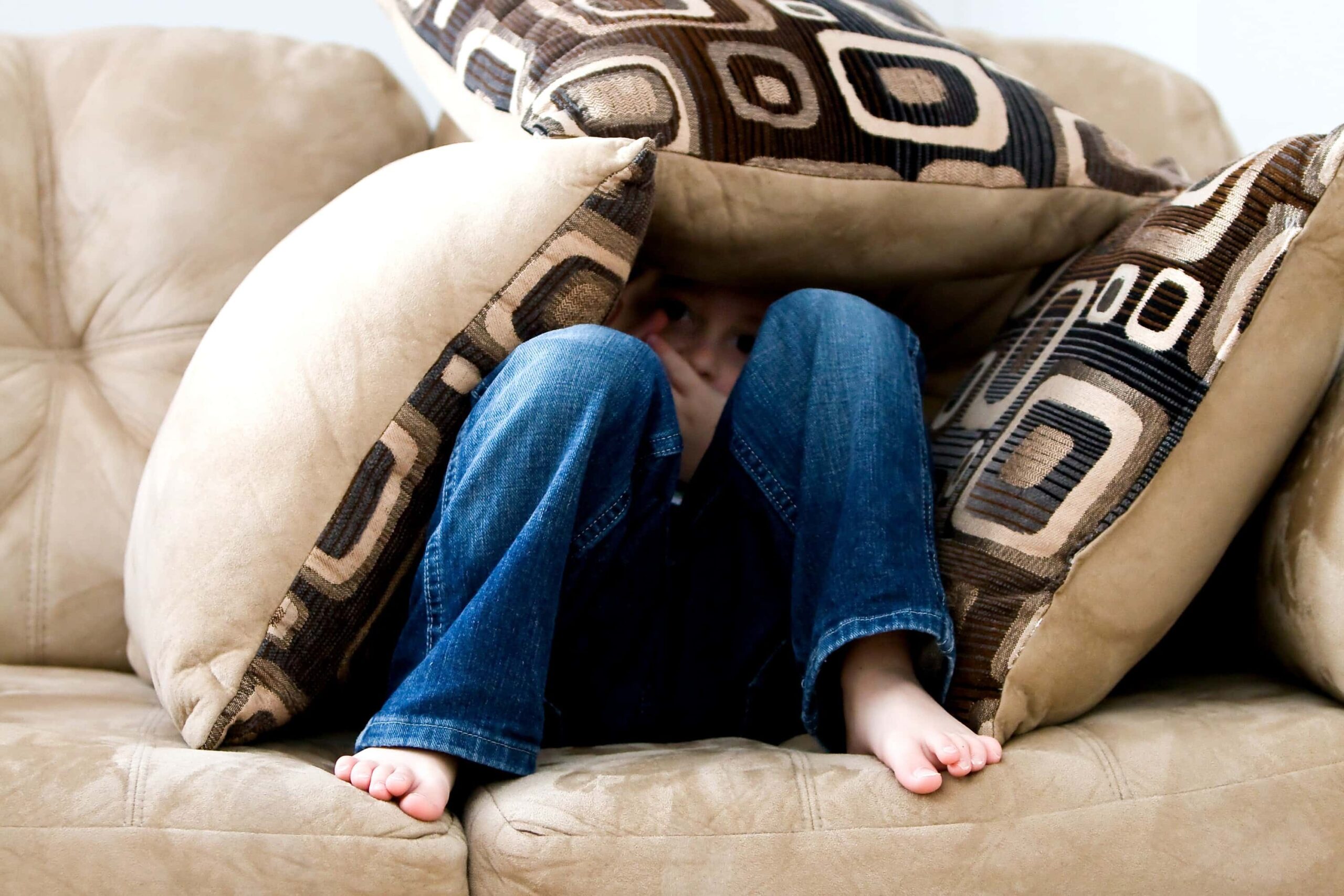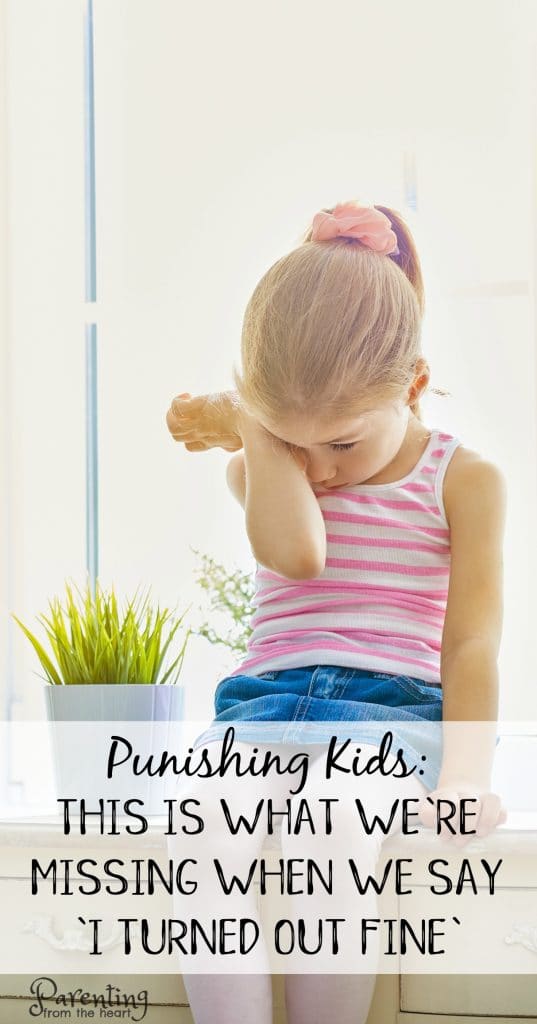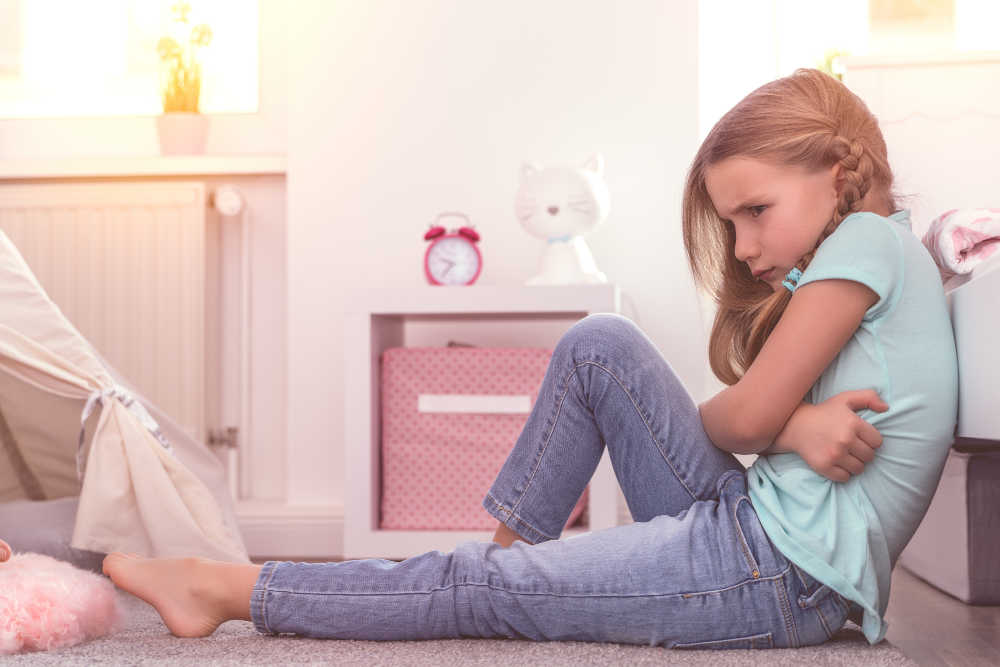Research says punishment is not an effective way of raising our kids. But so many of us were punished and turned out fine. Find out what research says to that argument.
It was one of those best-laid-plans-gone-awry type moments resulting from an epic meltdown.
We had just gotten to the park. Anticipating a couple of hours of play, I had snacks, ice cold water bottles, and kids who were white with sunscreen. I found a spot in the shade for the baby and me. There I could oversee my older kids play. I thought I was hunkering down for a while…
Almost instantly my kids began needling each other.
My son didn’t want to ride his bike but didn’t want my daughter to touch it either. I prayed some other kids would show up and distract them from their bickering. Quickly, I realized we needed to go home. I informed them of our departure and packed up our stuff. Not wanting to stay but also not wanting to go, my son got upset.
“Mama! Take! My! Bike!” Not wanting to stay but also not wanting to go, my four-year-old was incensed.
It was the beginning of a power struggle.
Because I had a stroller to push, I couldn’t help him with his bike. He wasn’t willing to take it home. As kindly as I could, I said I knew he was upset and I understood he wished I could help. But he was past that point of logic.
As I practiced my yoga breathing, I assured him I would wait as long as it took for him to take his bike the one block to our house.

In a two-steps-forward-one-step-back fashion, we made our way out of the park. To prove he was acting against his will, my son stopped about every meter to scream a primal grunt of frustration. As we inched our way down our street, a voice cut through our melodrama.
“When I was a kid, I would’ve gotten a good smack for acting like that.”
It was one of my neighbours who had been sitting reading on his nearby porch. I smiled sheepishly. It wasn’t the first time I had heard this and it likely wouldn’t be the last.
I’m well aware that there are still many people who feel that a good spanking would put an end to a child’s misbehaviour. And for every proponent of spanking out there, there are even more who feel children should be punished to learn respect and listen better.
To be honest, I was once one of them.
Of course, I had heard times that parents shouldn’t spank their children. But I knew countless people who were spanked and grew up to be upstanding, well-rounded people. Truthfully, I had excellent parents who loved me unconditionally.
I couldn’t help but wonder if positive parenting was a trend that would pass in time. Moreover, I didn’t want to raise entitled children. Taking away both spanking and timeouts seemed like it would handcuff my ability to parent and parent effectively.
Despite my disbelief, I decided to investigate.
I spoke to a social worker who specialized in family therapy. I dusted off my university login details and headed into psych databases filled with research studies. And, I read any news article I could find on the subject.
Here is what I found out about punishment versus positive discipline.
When I spoke to the social worker, she confirmed what I had heard about timeouts. She explained that timeouts can underscore the hurt that caused the misbehaviour in the first place. She went on to say connecting with the child was far more effectual.
When I started digging into newspaper and research articles, I discovered that in around the time that Gen Xers were born, there was an influx of research against spanking. Specifically, these studies found that an increase corporal punishment correlated with an increase in mental illness and aggression in children. A 50-year meta-analysis from the University of Michigan and the University of Austin Texas found that kids who were spanked were more likely to exhibit antisocial behaviour, aggression, mental health problems, and cognitive difficulties.
Connection is what motivates children to follow our guidance. We can’t really make anyone do something without using force, and that only lasts as long as we have a substantial physical advantage. Our children have to choose to do what we say.
– Dr Laura Markham, clinical psychologist
Despite these findings, parents witness increased compliance after using punishment and deduce that it makes sense.
And the truth is children do comply immediately after being punished.
- In an analysis of 88 studies across 62 years, psychologist Elizabeth Thompson Gershoff found that there is a general consensus that the use of force when disciplining actually increases compliance temporarily.
- According to Dr Laura Markham, clinical psychologist, timeouts work. They use a fear of abandonment or love withdrawal to elicit obedience.
The problem is that increased compliance does not mean a child is learning to behave. What’s happening is the child is learning to avoid punishment. And while that may sound like one in the same, it actually isn’t.
Here’s why…
In a study, Patterns of child-rearing, researchers found that children were the least likely to internalize their parents’ values and ideals when ‘power assertion’ was used. Specifically, children whose parents took away their toys, lost a privilege or forced to do something were less likely to show the desire to cooperate with their parents’ rules.
So back to that argument: ‘I was raised using punishment and I turned out fine.’
When positive discipline articles circle the internet, this response is inevitable. Obviously, I too thought this. And the truth is, there is merit to this notion. In the above-mentioned study conducted by Elizabeth Gershoff, she found that situational factors, namely parental relationship, mitigated the negative effects of spanking. So, it is possible to have been parented using harsh punishment and turn out fine. The problem with this is that this method of discipline isn’t an asset but something to be compensated for.
It causes damage.
Research has shown a positive correlation between spanking and physical abuse. What that means is that the more a parent spanks a child, the more likely he or she is to cross over into abusing his or her child. Additionally, when we use punitive methods such as spanking or timeouts, we aren’t necessarily teaching our child.
Instead, the methodology that research unequivocally favours is positive discipline. Instead of using force, this method of parenting relies on clear boundaries and connectedness. Positive or authoritative parents seek to establish why their children are misbehaving, they coach them through their problems and seek solutions together.
Related reading: Positive Parenting Disciplinary Techniques
In conclusion, punishment does work in the short term but it creates a desire to avoid punishment rather than a desire to make good choices. Spanking and other forms of harsh punishment do decrease the incidence of misbehaviour. But ultimately, those practices are ones that need to be compensated for in order to avoid dysfunction. Positive discipline promotes internalized moral reasoning and isn’t damaging.













Great post! I appreciate that you made reference to research. As a former child and adolescent therapist, I have heard these quotes about spanking from parents so many times before. Although punishment/ discipline can certainly be effective and can be used in more positive ways, I always emphasize the importance of establishing a positive foundation first. I’ve nominated you for the Blogger Recognition Award. Check it out: http://www.naturalbornmommy.com/blogger-recognition-award/
-Angela | Natural Born Mommy
Excellent article Alana!im a great believer in attachment theory as a way to develop strategies to help children
Excellent article! Just curious-And what happened to your 4-year old?
He was just overtired <3
Great article! I hate the phrase “i turned out fine”. Yes we are all “fine” but with tons of underlying issues unfortunately